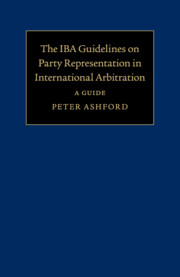Book contents
- Frontmatter
- Contents
- Dedication
- Preface and dedication
- Cases
- About the IBA Arbitration Committee
- The Guidelines
- Definitions
- Guidelines 1–3
- Guidelines 4–6
- Guidelines 7–8
- Guidelines 9–11
- Guidelines 12–17
- Guidelines 18–25
- Guidelines 26–27
- Appendix 1 Extract from the LCIA Arbitration Rules 2014 and Annex to the LCIA Rules
- Appendix 2 Interaction of IBA Rules with major professional conduct rules
- Appendix 3 Interaction of IBA Rules with major institutional rules
- Index
Guidelines 26–27
Published online by Cambridge University Press: 05 July 2016
- Frontmatter
- Contents
- Dedication
- Preface and dedication
- Cases
- About the IBA Arbitration Committee
- The Guidelines
- Definitions
- Guidelines 1–3
- Guidelines 4–6
- Guidelines 7–8
- Guidelines 9–11
- Guidelines 12–17
- Guidelines 18–25
- Guidelines 26–27
- Appendix 1 Extract from the LCIA Arbitration Rules 2014 and Annex to the LCIA Rules
- Appendix 2 Interaction of IBA Rules with major professional conduct rules
- Appendix 3 Interaction of IBA Rules with major institutional rules
- Index
Summary
26. If the Arbitral Tribunal, after giving the Parties notice and a reasonable opportunity to be heard, finds that a Party Representative has committed Misconduct, the Arbitral Tribunal, as appropriate, may:
(a) admonish the Party Representative;
(b) draw appropriate inferences in assessing the evidence relied upon, or the legal arguments advanced by, the Party Representative;
(c) consider the Party Representative's Misconduct in apportioning the costs of the arbitration, indicating, if appropriate, how and in what amount the Party Representative's Misconduct leads the Tribunal to a different apportionment of costs;
(d) take any other appropriate measure in order to preserve the fairness and integrity of the proceedings.
27. In addressing issues of Misconduct, the Arbitral Tribunal should take into account:
(a) the need to preserve the integrity and fairness of the arbitral proceedings and the enforceability of the award;
(b) the potential impact of a ruling regarding Misconduct on the rights of the Parties;
(c) the nature and gravity of the Misconduct, including the extent to which the Misconduct affects the conduct of the proceedings;
(d) the good faith of the Party Representative;
(e) relevant considerations of privilege and confidentiality; and
(f) the extent to which the Party represented by the Party Representative knew of, condoned, directed, or participated in, the Misconduct.
IBA COMMITTEE COMMENTS
Comments to Guidelines 26–27
Guidelines 26–27 articulate potential remedies to address Misconduct by a Party Representative.
Their purpose is to preserve or restore the fairness and integrity of the arbitration.
The Arbitral Tribunal should seek to apply the most proportionate remedy or combination of remedies in light of the nature and gravity of the Misconduct, the good faith of the Party Representative and the Party whom he or she represents, the impact of the remedy on the Parties’ rights, and the need to preserve the integrity, effectiveness and fairness of the arbitration and the enforceability of the award.
Guideline 27 sets forth a list of factors that is neither exhaustive nor binding, but instead reflects an overarching balancing exercise to be conducted in addressing matters of Misconduct by a Party Representative in order to ensure that the arbitration proceed in a fair and appropriate manner.
Before imposing any remedy in respect of alleged Misconduct, it is important that the Arbitral Tribunal gives the Parties and the impugned Representative the right to be heard in relation to the allegations made.
- Type
- Chapter
- Information
- The IBA Guidelines on Party Representation in International ArbitrationA Guide, pp. 97 - 120Publisher: Cambridge University PressPrint publication year: 2016

